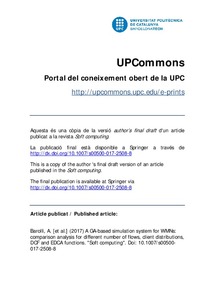Mostra el registre d'ítem simple
A GA-based simulation system for WMNs: comparison analysis for different number of flows, client distributions, DCF and EDCA functions
| dc.contributor.author | Barolli, Admir |
| dc.contributor.author | Oda, Tetsuya |
| dc.contributor.author | Matsuo, Keita |
| dc.contributor.author | Cuka, Miralda |
| dc.contributor.author | Barolli, Leonard |
| dc.contributor.author | Xhafa Xhafa, Fatos |
| dc.contributor.other | Universitat Politècnica de Catalunya. Departament de Ciències de la Computació |
| dc.date.accessioned | 2017-04-25T10:24:20Z |
| dc.date.available | 2018-02-06T01:30:36Z |
| dc.date.issued | 2017-02-04 |
| dc.identifier.citation | Barolli, A., Oda, T., Matsuo, K., Cuka, M., Barolli, L., Xhafa, F. A GA-based simulation system for WMNs: comparison analysis for different number of flows, client distributions, DCF and EDCA functions. "Soft computing", 4 Febrer 2017, vol. 22, num. 5, p.2547-2555. |
| dc.identifier.issn | 1432-7643 |
| dc.identifier.uri | http://hdl.handle.net/2117/103698 |
| dc.description.abstract | In this paper, we compare the performance of Distributed Coordination Function (DCF) and Enhanced Distributed Channel Access (EDCA) for normal and uniform distributions of mesh clients considering two Wireless Mesh Network (WMN) architectures. As evaluation metrics, we consider throughput, delay, jitter and fairness index metrics. For simulations, we used WMN-GA simulation system, ns-3 and Optimized Link State Routing. The simulation results show that for normal distribution, the throughput of I/B WMN is higher than Hybrid WMN architecture. For uniform distribution, in case of I/B WMN, the throughput of EDCA is a little bit higher than Hybrid WMN. However, for Hybrid WMN, the throughput of DCF is higher than EDCA. For normal distribution, the delay and jitter of Hybrid WMN are lower compared with I/B WMN. For uniform distribution, the delay and jitter of both architectures are almost the same. However, in the case of DCF for 20 flows, the delay and jitter of I/B WMN are lower compared with Hybrid WMN. For I/B architecture, in case of normal distribution the fairness index of DCF is higher than EDCA. However, for Hybrid WMN, the fairness index of EDCA is higher than DCF. For uniform distribution, the fairness index of few flows is higher than others for both WMN architectures. |
| dc.language.iso | eng |
| dc.publisher | Springer |
| dc.subject | Àrees temàtiques de la UPC::Informàtica |
| dc.subject | Àrees temàtiques de la UPC::Enginyeria de la telecomunicació::Telemàtica i xarxes d'ordinadors |
| dc.subject.lcsh | Wireless communication systems |
| dc.subject.lcsh | Computer algorithms |
| dc.subject.other | Genetic algorithms |
| dc.subject.other | Wireless mesh networks |
| dc.subject.other | Ns-3 |
| dc.subject.other | Normal distribution |
| dc.subject.other | Uniform distribution |
| dc.subject.other | DCF |
| dc.subject.other | EDCA |
| dc.title | A GA-based simulation system for WMNs: comparison analysis for different number of flows, client distributions, DCF and EDCA functions |
| dc.type | Article |
| dc.subject.lemac | Comunicació sense fil, Sistemes de |
| dc.subject.lemac | Algorismes genètics |
| dc.identifier.doi | 10.1007/s00500-017-2508-8 |
| dc.description.peerreviewed | Peer Reviewed |
| dc.relation.publisherversion | http://link.springer.com/article/10.1007/s00500-017-2508-8 |
| dc.rights.access | Open Access |
| local.identifier.drac | 19685353 |
| dc.description.version | Postprint (author's final draft) |
| local.citation.author | Barolli, A.; Oda, T.; Matsuo, K.; Cuka, M.; Barolli, L.; Xhafa, F. |
| local.citation.publicationName | Soft computing |
| local.citation.volume | 22 |
| local.citation.number | 8 |
| local.citation.startingPage | 2547 |
| local.citation.endingPage | 2555 |
Fitxers d'aquest items
Aquest ítem apareix a les col·leccions següents
-
Articles de revista [1.049]


